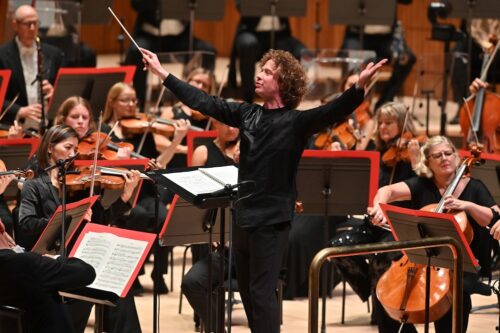 United Kingdom Richard Strauss, Wagner: Miah Persson (soprano), Philharmonia Orchestra / Santtu-Matias Rouvali (conductor). Royal Festival Hall, London, 4.11.2021. (CC)
United Kingdom Richard Strauss, Wagner: Miah Persson (soprano), Philharmonia Orchestra / Santtu-Matias Rouvali (conductor). Royal Festival Hall, London, 4.11.2021. (CC)

R. Strauss – Vier letzte Lieder (1948)
Wagner/Maazel – The Ring without Words (1848-76/1987)
The Ring without Words is Lorin Maazel’s 70-plus minute tour of the Wagner’s Ring cycle, chronologically ordered, somewhat weighted towards Götterdämmerung and with a sheaf of movement titles that are quaint in a rather old-fashioned way: ‘Wotan’s Rage’; ‘Donner Summons a Thunderstorm’, ‘Siegmund forges the magic sword’, and so on.
‘Bleeding chunks’ have always been problematic for die-hard Wagnerians, despite their popularity. The ‘art of transition’ is a core tenet of Wagnerian thought, and to have passages juxtaposed or connected by the flimsiest of threads does leave one feeling short-changed. Vocal lines (such as Donner’s) when we do hear them transferred to solo orchestral players (trombone for Donner, for example). The shift from Das Rheingold to Die Walküre is abrupt indeed – fine, it is in the Ring, although generally with a day in between – but it feels contrived. All credit to the Philharmonia for giving their all to this strange abomination (a ‘symphonic metamorphosis’, perhaps), and for shifting moods on a sixpence when required (the end of the first act of Walküre comes upon one rather suddenly). Good to hear at least some of the second act of Walküre; it is one of Wagner’s great glories but is continually overshadowed by the heldentenor antics of the first act on one side and ‘The Ride of the Valkyries’ on the other. We only hear Wotan’s ‘Wo ist Brünnhild’’ in our imagination, though; like an overkeen waiter swiping away our unfinished plate, we are off to the next course as imagined Valkyries swoop around in their ‘Ride’.
It was the Siegfried portion that was most memorable here, with a chorus of offstage anvils balanced by simply beautiful woodwind playing in the ‘Forest Murmurs’. Performance-wise, it was in the final Götterdämmerung section that things really lit up (funeral pyre puns disallowed at this point). The glowering chunks of ‘Dawn’, ‘Siegfried’s Rhine Journey’ and ‘Brünnhilde’s Immolation’ allowed the Philharmonia to shine. Lovely to see a slideless trombone used as Hagen’s steerhorn, relishing every dissonance, and one must acknowledge the superb skills of the Philharmonia’s newly confirmed Principal Horn, Diego Incertis Sánchez, in a curtailed Siegfried Horn Call (and one must admire his nippiness in getting back to his seat from his offstage position in time for the next solo).
Maazel’s ‘symphonic metamorphosis’/tone poem/thing – however one wishes to label it – remains a curiosity worth hearing perhaps once in a blue moon. In some senses it almost felt nostalgic to hear Wagner like this; but it remains rather badly sewn together, brash and unwieldy.
Actually, Sánchez acts as rather nice link to the Strauss first half: his closing horn solo in ‘September’, the second of Strauss’s Vier letzte Lieder, was a miracle of control and beauty. This was a performance of the Four Last Songs of often remarkable subtlety. Perhaps sometimes too subtle, as if Santtu-Matias Rouvali and Miah Persson had decided to add the solo voice as one more line for the orchestral texture (this true particularly of the final song, ‘Im Abendrot’). But Persson’s voice suited Rouvali’s crystal transparency of texture perfectly; she also has the ability to spin a massively long line.
Violin solos from leader Benjamin Marquise Gilmore were another layer of beauty to the third song (‘Beim Schlafengehen’), but it was the crepuscular sounds of the final song that lingers long in the memory.
Rouvali is certainly keen to make his mark: his conducting is dynamic and enthusiastic. The jury’s still out, though.
Colin Clarke
